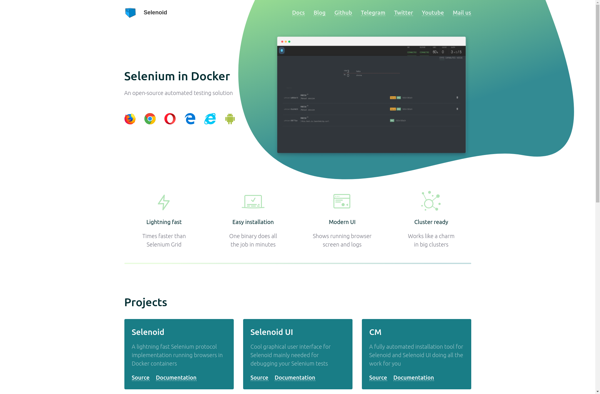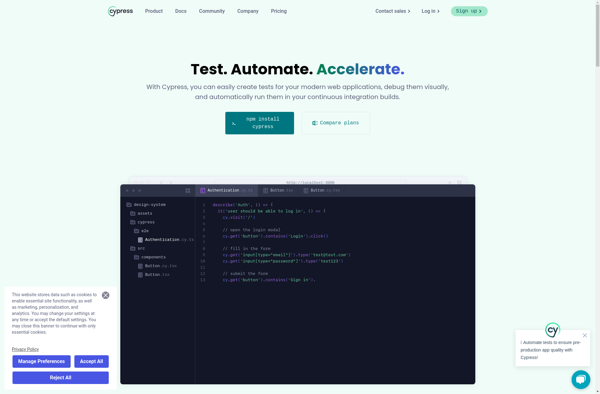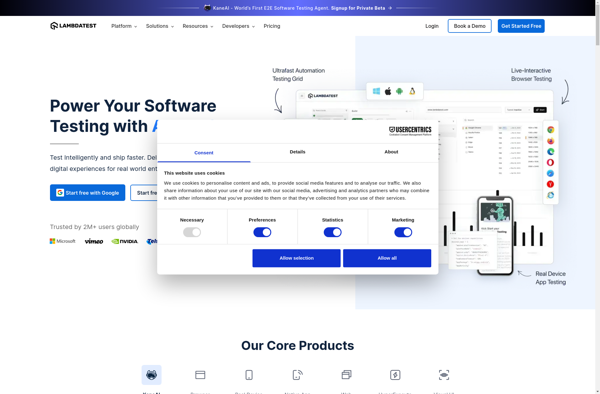Selenoid
Selenoid is an open source alternative to browser testing tools like Selenium Grid. It is lightweight, scalable, and allows running browser tests in Docker containers.

Selenoid: Lightweight Browser Testing Alternative
Selenoid is an open source alternative to browser testing tools like Selenium Grid. It is lightweight, scalable, and allows running browser tests in Docker containers.
What is Selenoid?
Selenoid is an open source tool for running browser automation tests in Docker containers. It offers a lightweight and scalable alternative to solutions like Selenium Grid or Sauce Labs.
Some key features and benefits of Selenoid include:
- Runs each browser session in a separate Docker container for improved stability and performance.
- Scales horizontally to handle large test loads by adding more Docker containers.
- Supports all popular browsers like Chrome, Firefox, Edge, and their variations.
- Has a very small footprint and resource requirements compared to other solutions.
- Integrates easily into CI/CD pipelines with support for Kubernetes and other orchestrators.
- Offers video recording of test sessions along with logs and screenshots.
- Completely open source and available free of cost without any restrictions.
Overall, Selenoid provides a flexible, cost-effective way to set up a scalable browser testing infrastructure for automation teams. Its lightweight Docker-based architecture makes it easy to spin up and manage large clusters of parallel test environments.
Selenoid Features
Features
- Runs browser tests in Docker containers
- Supports Selenium WebDriver protocol
- Scalable - can run multiple browser sessions in parallel
- Lightweight - consumes fewer resources than Selenium Grid
- Open source and free to use
Pricing
- Open Source
- Free
Pros
Easy setup and configuration
Cost effective compared to paid solutions like BrowserStack
Allows testing on different browsers and versions
Integrates well with CI/CD pipelines
Active open source community
Cons
Limited browser support compared to commercial solutions
Requires more technical expertise to operate
Not as feature rich as proprietary tools
Lacks official support channels
Official Links
Reviews & Ratings
Login to ReviewThe Best Selenoid Alternatives
Top Development and Testing and other similar apps like Selenoid
Here are some alternatives to Selenoid:
Suggest an alternative ❐Selenium
Selenium is an open-source automated testing suite for web applications across different browsers and platforms. It provides a playground for automating web-based application testing to test web apps across different browsers and platforms like Firefox, Chrome, Internet Explorer, Safari etc. It also provides an infrastructure for the W3C WebDriver specification...
Cypress.io
Cypress.io is an open source, front end automated testing tool that makes it easy to test anything that runs in the browser. Built specifically for modern web applications, Cypress allows you to write all types of tests: end-to-end tests, integration tests, unit tests, etc.Key features of Cypress include:Runs directly in...

LambdaTest
LambdaTest is a leading cloud-based cross browser testing platform that enables users to test their websites and web applications across 2000+ different browsers, browser versions, and operating systems. With LambdaTest, developers and testers can perform both manual and automated testing on a scalable, secure, and high-performance online grid.Key features of...

Puppeteer
Puppeteer is a Node.js library developed by Google which provides a high-level API to control headless Chrome or Chromium over the DevTools Protocol. It allows developers to automate browser testing and scraping tasks.Some key features of Puppeteer:Launch a browser instance programmatically with full control over browser settingsGenerate screenshots and PDFs...
